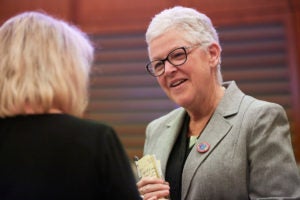Physicians, health leaders discuss how to address the health impacts of climate change
February 19, 2020 – Climate change—and how it affects health—should be front and center for doctors, health care workers, and hospitals.
That was the key message at a February 13, 2020 symposium that drew a couple hundred attendees to the Joseph B. Martin Conference Center at Harvard Medical School (HMS). Speakers at the event talked about how clinicians can use their understanding of the effects of climate change to improve care for their patients, and how hospitals can reduce their carbon footprint and provide leadership beyond their walls in stemming the climate crisis.
The event was hosted by HMS, Harvard T.H. Chan School of Public Health’s Center for Climate, Health, and the Global Environment (C-CHANGE), the Harvard Global Health Institute, and the New England Journal of Medicine (NEJM). Sponsors included all of Boston’s major teaching hospitals. Co-directors of the symposium were Renee Salas, an emergency room physician at Massachusetts General Hospital (MGH) and Yerby Fellow at C-CHANGE; Aaron Bernstein, pediatrician at Boston Children’s Hospital and interim director of C-CHANGE; and Caren Solomon, NEJM deputy editor and Brigham and Women’s Hospital physician.

After a welcome from Eric Rubin, Irene Heinz Given Professor of Immunology and Infectious Diseases at Harvard Chan School and editor of NEJM, Salas gave an opening keynote about why the climate crisis matters for clinical practice. She talked about climate-related effects in patients she’s cared for in the MGH emergency room. One was a four-year-old girl who had repeated asthma attacks from higher-than-normal pollen levels. Another was an elderly man whose un-air conditioned apartment was so hot that his temperature rose to 106 degrees.
Salas listed the planetary impacts of climate change—higher temperatures, extreme weather, rising sea levels, and air pollution from CO2, ozone, and wildfire smoke—and a wide range of climate-related health impacts, including heat-related illness, cardiovascular and respiratory issues, pregnancy problems, worsening mental health, loss of nutrients and protein in certain crops, and an increase in the spread of water- and vector-borne diseases. Extreme weather events have already interfered with hospitals’ ability to care for patients and have disrupted supply chains, she said.
Steps to offset climate change’s health impacts could include training clinicians on how to deal with power outages, educating them about heat-related illnesses, and urging health workers to consider climate-related impacts when screening, diagnosing, or treating patients, Salas suggested. As an example, she pointed out that medications in inhalers and EpiPens may lose effectiveness if they sit in a hot car too long—crucial information for both doctors and patients to be aware of.
Gaurab Basu, a primary care doctor at Cambridge Health Alliance, noted that New England is warming faster than anywhere else in the U.S., and that poorer communities often have “heat islands”—areas with a lot of concrete and asphalt where temperatures can soar 10 to 15 degrees hotter than in neighborhoods with more trees. He said it’s important for doctors to ask patients if they have an air conditioner at home or if their community has a cooling center.
Children are particularly vulnerable to air pollution and pollen, in part because they spend a lot of time outside, said Lucy Marcil, a pediatrician at Boston Medical Center. She said it’s important to share information on climate’s health effects with both patients and colleagues. “If people are not aware of it, they can’t act on it,” she said. Pulmonologist Mary Rice of Beth Israel-Deaconess Medical Center suggested that, for patients with allergies, doctors can recommend that they check the EPA Air Quality Index and local air pollen counts, or use an air purifier at home.
Regina LaRocque, an infectious disease specialist and researcher at MGH, said that climate change is likely responsible for rising rates of dengue in South America, Valley Fever in California, and Lyme disease in New England. There’s also new evidence linking rising temperatures to increased antibiotic resistance. She urged doctors to take good patent histories—including asking people where they have lived and traveled, and what they might have been exposed to—and to remind patients to wash their hands, practice good sneezing etiquette, avoid insects, and get vaccinations.
Extreme weather, like excessive heat, “makes all mental illness worse,” said psychiatrist Gary Belkin, a visiting scientist at C-CHANGE. So-called “climate anxiety” can, for some patients, lead to impaired concentration, loss of sleep, and an inability to enjoy life. Doctors can help by suggesting strategies such as mindful meditation or controlled breathing, he said.
Several panelists said it’s important to share concerns about climate with hospital leaders and to create workplace teams to address climate-related issues. They also urged audience members to write to or meet with elected officials. “Putting ourselves forward as physicians and trusted members of society talking about [climate change] is valuable in itself, because there are concerted efforts to confuse people about the science,” noted LaRocque.

Gina McCarthy, president and CEO of the National Resources Defense Council, professor of the practice of public health at Harvard Chan School, and chair of the C-CHANGE Board of Advisors, moderated a panel of Boston-area health leaders. One of the panelists, Kathleen Walsh, president and CEO of Boston Medical Center, said that sustainability became a priority at the hospital because of efforts to reduce spending on energy. She added that the hospital’s actions to offset climate harms—such as its goal of becoming carbon-neutral by the end of 2020—have been “empowering to our workforce.”
Looking out at the crowded room at the end of the symposium, Bernstein commented, “As a group of people dedicated to the care of humanity and our responsibility to society, I consider this a watershed moment in the history of climate change, not just in the United States, but around the world.”
photos: Kent Dayton
